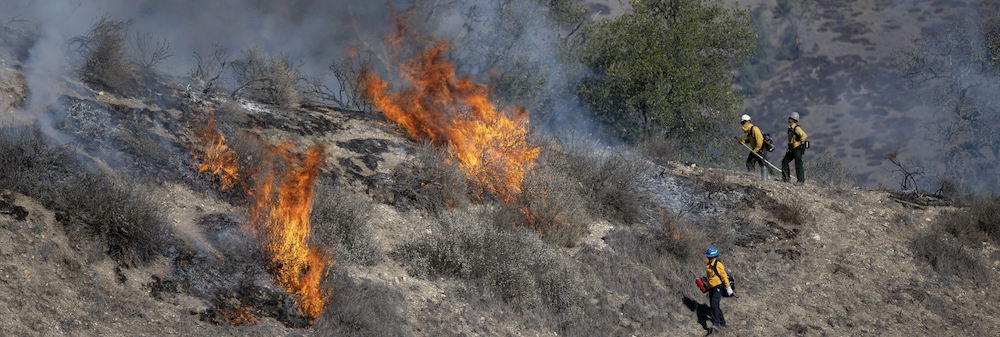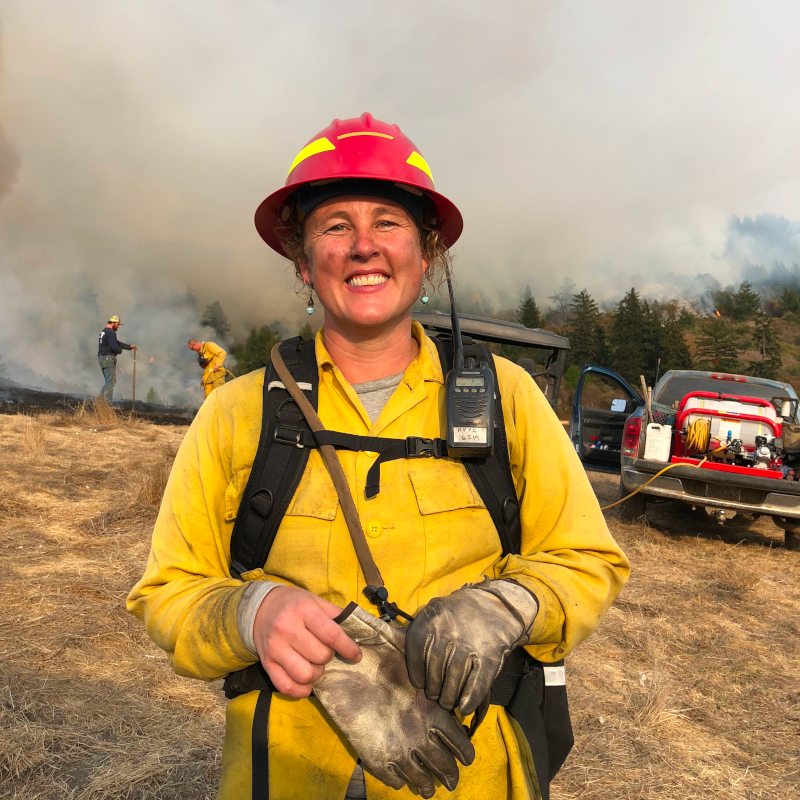 Conducting a prescribed burn in Santa Barbara County, California. Image credit: Jeff Rumans, BurnBot Inc.
Conducting a prescribed burn in Santa Barbara County, California. Image credit: Jeff Rumans, BurnBot Inc.
By Shefali Juneja Lakhina, Lenya Quinn-Davidson, Brandon Smith, and Daniel Godwin
Communities across the United States are contending with deteriorating forest health and a fuel management crisis. Although a range of strategies are being employed to address escalating wildfire risk, implementation will be challenging without a sustained, diverse, and future-ready forestry and fire workforce.
Federal, state, and local agencies are currently experiencing a severe capacity gap and retention challenges are making it worse. Policy actions that develop a robust infrastructure of care—including health insurance, secure housing, and inclusive career development pathways—are critical.
The Need for Care, Equity, and Justice in the Informal Workforce
Much-needed work is underway to ensure the federal firefighting workforce has family-sustaining, career-track jobs, with equitable pay and benefits. A number of state and local efforts to train more people in forestry and fire jobs are also in progress. Recent wildfire risk management strategies, such as the U.S. Forest Service Confronting the Wildfire Crisis, California’s Wildfire and Forest Resilience Action Plan, and Colorado’s Strategic Wildfire Action Program also detail ambitious goals.
In addition to these ongoing efforts, there is also a need to address the lived experiences of the informal workforce, which is marginalized, largely uncounted, and often composed of volunteers, students, and seasonal and temporary workers—including migrant and incarcerated workers. These workers are already contributing to essential agriculture, forestry, and fire management work; however, their labor is not counted, nor is it equitably compensated.
Fair recognition of the contributions of informal workers to the restoration of local forests and economies can help meet fuel reduction and climate mitigation goals. It can also ensure that equitable working standards—including pay, health care, housing, safety, and well-being—are guaranteed for all workers in our fiery future. We know this because we’ve seen it in action.
Case Studies in Improving Workforce Capacity
At the 47th Annual Natural Hazards Workshop, we held a plenary discussion—Reimagining Caring, Equitable, and Just Futures in a Fiery World—which highlighted how community-centered coalitions, volunteer associations, and small businesses that train and hire informal workers are leading with narratives and practices to reimagine care, equity, and justice for all workers in the future.
Drawing on Wonder Labs’ Reimagining 2025: Living with Fire Design Challenge methodology, we discussed three case studies that show how place-based efforts are reimagining forestry and fire capacities for inclusive, equitable, and socially just outcomes. They included:
California’s prescribed burn associations, which affect systems change using workforce-led and community-centered organizing and policy. These grassroots efforts reimagine a future with fire and contribute to an empowering shift from the previous era of fire suppression by professionals to a more democratic era of fire stewardship by all people.
The Forestry and Fire Recruitment Program, which addresses structural inequities by providing employment and integration pathways in California’s Conservation Camps for incarcerated people. It also enables whole-person care and well-being for formerly incarcerated firefighters.
The Ember Alliance, which works to create a kind, diverse, and robust fire management workforce that supports the development of fire-adapted and resilient communities in Colorado by partnering with underserved and underrepresented people.
Research for a Reimagined Future
As we prepare to live and work in a fiery future, we call for a convergence research and practice agenda to pursue the following kinds of questions. Our hope is these research questions will inform the development and implementation of more caring and just policies for all workers.
Who is doing the work? To understand the diversity of the forestry and fire workforce, we need a better count and characterization of who is doing this essential work. Research can identify who comprises the informal workforce across sectors—in firefighting, logging, forestry services, power, manufacturing, and agriculture—as well as how the work is being counted and compensated.
How is the forestry and fire workforce experiencing care, safety, and well-being? To understand how forestry and fire practitioners find a sense of belonging, care, and empowerment in the “fire world,” it is important to engage with the life experiences of diverse workers. This includes understanding who is receiving what kind of education, training, skills development, and mentoring and from what avenues.
Research can also contribute to a deeper understanding of collective bargaining, including how unionized and labor mechanisms protect and care for different categories of workers in the forestry, fire, and agricultural sectors. Finally, research can encourage accountability by critically examining how state and local institutions are fulfilling a duty of care towards an increasingly marginalized, informal, temporary, and seasonal workforce.
What is needed to enable a workforce-led and community-centered just and equitable transition? By engaging with diverse workforce perspectives and lived experiences, research can provide insights into what needs to be reimagined for a community-centered transition led by the workforce. Research can also identify entry points for federal and state policy to be more responsive to workers in diverse contexts, including rural and tribal lands. It can reveal concrete pathways to democratizing fire governance so all people can be stewards of land and fire. Finally, building on current policy momentum, research can identify how federal and state authorities can prioritize investments in building an infrastructure of care that ensures parity of benefits for all workers.
As we prepare to reimagine life and work in our fiery future, research and policy will have to pay closer attention to how care, equity, and justice can be achieved in inclusive ways for all workers.

Shefali Juneja Lakhina is the founder of FireUp, a career platform exclusively dedicated to the fire and forestry workforce. Over the past 20 years, she has developed disaster resilience policy, programs, and research across Asia, the Middle East and North Africa, Europe, Australia, and the United States. In 2020, she cofounded Wonder Labs, a climate justice think-and-do-tank based in California. She is the author of the State of FireTech Report and host of Innovating on the Frontlines: The FireTech Podcast.